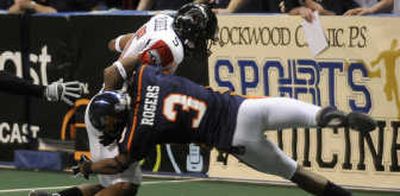No quit in Rogers: Shock DB overcomes obstacles

There were mornings in high school that Nygel Rogers watched the bus pass by him at 6. Only he wasn’t on his way to school. The veteran Spokane Shock defensive back was heading home from a night out with friends, and he didn’t hear anything about it from his mom.
“I don’t want to say she didn’t care – because she did care – but she didn’t stress on me about coming in the house late or where I was,” Rogers said. “She let me choose my friends and experience life through trials and tribulations.”
One of the most trying experiences came the summer before his junior year, when his mother lost her three-year battle with breast cancer.
Rogers, 16 at the time, wasn’t close with his father, so he moved in with his best friend.
“It was hard at first,” Rogers said. “It’s still hard today.”
For the 27-year-old, growing up in Bishopville, S.C., wasn’t always easy either. There weren’t a wealth of opportunities, and because of that most kids Rogers knew were influenced by gangs, violence and drugs.
Rogers watched as people continuously left town, only to end up coming right back.
He also admitted he got into trouble as a young kid, though it was never anything major. That’s because Rogers, who missed 51 days of school his senior year, had football to keep him going.
“I wasn’t robbing or stealing or fighting, I was just chilling,” he said. “I had a lot of friends getting into that stuff, though, because they weren’t really shooting for anything. I wanted to do well for myself.”
His grandma wanted him to do well, too, and she made sure to deliver the message loud and clear.
“She’s just always on your back … definitely a nagger,” Rogers said. “She’s not a whipping grandmamma, she’s just always asking stuff like, ‘If I leave, who’s going to take care of the family?’ She hit me with that a lot.”
Not that he minded.
“I like to listen to old folks,” Rogers said. “I’ll sit around an old person all day, because I think they’re very keen and have a lot of knowledge.”
Rogers and his grandma are still close today. They talk, Rogers said, when he can manage to get her on the phone.
“My grandma stays in the streets – at least once a month she’s in a different city,” Rogers said. “She has a cell phone, and she’s 80. My grandma can’t use the Internet, and she won’t get cable in her house, but she’ll keep her cell phone.”
When high school graduation rolled around in 1999, Rogers hadn’t done enough academically to draw the interest of any big-time colleges. He ended up at Georgia Military College, an experience he calls one of the hardest – but most fun – of his life.
He had to get up early in the morning, wear a uniform and have his shoes shined before going down for breakfast. They were grouped in platoons, marched, and had to keep their rooms spotless and beds made a certain way.
Though it was hard, he would do it all over again.
“Some people would get tired of it, and some people would break down – and it’s funny to see people break down,” Rogers said, although he clearly doesn’t mean it as an insult.
“I won’t call the people that came there and left quitters, because it’s just a different experience, especially when you’ve got kids that are 18 and 19 that just want to play football and they’re having to make it through military stuff. But me, I can pretty much deal with anything.”
So he stayed at Georgia Military for two years, missing his first season of football because of an ACL injury.
After his stint there, he was recruited by coach Jerry Moore to play for Appalachian State, where he started in 33 games over three seasons (he was at school for four years but missed the 2003 season with another ACL injury) and was a two-time All-Southern Conference first-team pick. He also earned his bachelor’s in communications and psychology.
Rogers went to camp as a free agent with the Washington Redskins in 2005 and the CFL’s Toronto Argonauts in 2006, but was cut – to his surprise – both times.
After heading home from Toronto, Rogers was turned on to the arena game. He started doing research, and came across the Shock in November 2006. The expansion franchise had just won the ArenaCup championship earlier that year.
“I didn’t want to be sitting at home, because there is no telling what could happen there,” said Rogers. “When I came across the Shock, I just felt like if I have to go play in the (af2), I’m going to go to the best.”
So Rogers called Shock general manager Adam Nebeker and left a message, which Nebeker played back for him the other day when he was erasing old messages from the phone in his Spokane Valley office.
“I couldn’t believe it,” Rogers said. “Who has two-year old messages on their phone?”
Shackleford called Rogers that December and Rogers arrived in Spokane in February of 2007. After a successful rookie campaign last season in which he amassed nine interceptions and 70 tackles, Rogers was thought to be a clear candidate to move on to the AFL.
Even he expected to.
“I was surprised and disappointed,” Rogers said. “But that’s just how it goes. I believe I’ll get my chance next year. I don’t give up – I’ve been through the trials and tribulations before, and I’ve come out OK.”